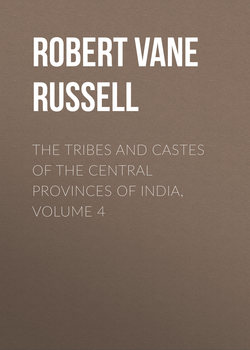Читать книгу The Tribes and Castes of the Central Provinces of India, Volume 4 - Robert Vane Russell - Страница 31
Part II
Articles on Castes and Tribes
Kumhār—Yemkala
Vol. IV
Kunbi
18. Muhammadan tendencies of Berār Kunbis
ОглавлениеIn Wardha and Berār the customs of the Kunbis show in several respects the influence of Islām, due no doubt to the long period of Muhammadan dominance in the country. To this may perhaps be attributed the prevalence of burial of the dead instead of cremation, the more respectable method according to Hindu ideas. The Dhanoje Kunbis commonly revere Dāwal Mālik, a Muhammadan saint, whose tomb is at Uprai in Amraoti District. An urus or fair is held here on Thursdays, the day commonly sacred to Muhammadan saints, and on this account the Kunbis will not be shaved on Thursdays. They also make vows of mendicancy at the Muharram festival, and go round begging for rice and pulse; they give a little of what they obtain to Muhammadan beggars and eat the rest. At the Muharram they tie a red thread on their necks and dance round the alāwa, a small hole in which fire is kindled in front of the tāsias or tombs of Hussain. At the Muharram36 they also carry horseshoes of silver or gilt tinsel on the top of a stick decorated with peacock’s feathers. The horseshoe is a model of that of the horse of Hussain. The men who carry these horseshoes are supposed to be possessed by the spirit of the saint, and people make prayers to them for anything they want. If one of the horseshoes is dropped the finder will keep it in his house, and next year if he feels that the spirit moves him will carry it himself. In Wardha the Kunbis worship Khwāja Sheikh Farīd of Girar, and occasionally Sheikh Farīd appears to a Kunbi in a dream and places him under a vow. Then he and all his household make little imitation beggars’ wallets of cloth and dye them with red ochre, and little hoes on the model of those which saises use to drag out horses’ dung, this hoe being the badge of Sheikh Farīd. Then they go round begging to all the houses in the village, saying, ‘Dam,37 Sāhib, dam.’ With the alms given them they make cakes of malīda, wheat, sugar and butter, and give them to the priest of the shrine. Sometimes Sheikh Farīd tells the Kunbi in the dream that he must buy a goat of a certain Dhangar (shepherd), naming the price, while the Dhangar is similarly warned to sell it at the same price, and the goat is then purchased and sacrificed without any haggling: At the end of the sacrifice the priest releases the Kunbi from his vow, and he must then shave the whole of his head and distribute liquor to the caste-fellows in order to be received back into the community. The water of the well at Sheikh Farīd’s shrine at Girar is considered to preserve the crops against insects, and for this purpose it is carried to considerable distances to be sprinkled on them.
Hindu boys on stilts
36
Furnished by Inspector Ganesh Prasād.
37
Dam: breath or life.
